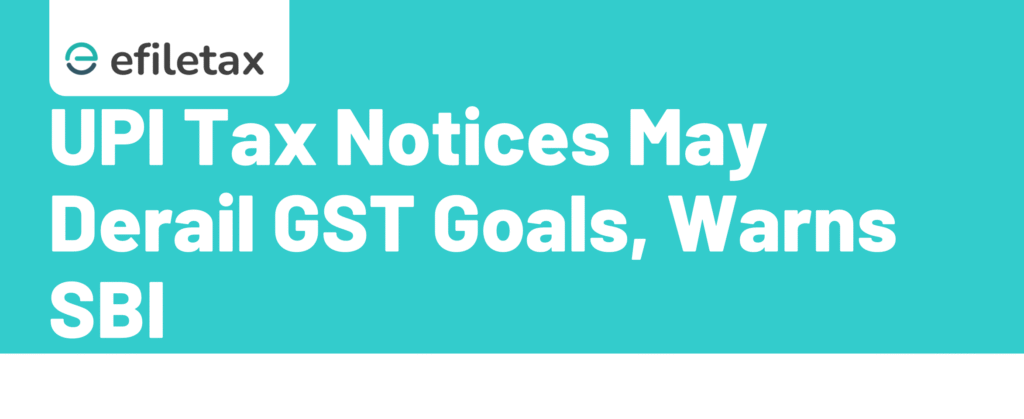
GST scrutiny on UPI payments: A growing concern for small businesses
With the GST regime pushing for digital formalisation, UPI transactions have become a visible trail for tax officers. But the growing GST scrutiny on UPI payments—especially for small traders—has triggered concerns of overreach and a return to cash-based dealings.
A July 2025 SBI research report flagged this as a serious risk. Several Bengaluru shopkeepers reportedly received excessive GST notices triggered purely by UPI activity, despite being compliant or below threshold limits. If not addressed with sensitivity, such practices may defeat GST’s core aim—bringing informal players into the formal tax net.
Let’s break this down for small businesses.
Why GST notices are being issued on UPI payments
GST officers are increasingly relying on digital footprints—UPI, bank credits, QR payments, etc.—to estimate business turnover. But without context, such indicators may lead to:
- Mismatched turnover assumptions
- Notices for non-filing or under-reporting
- Provisional assessments based on bank inflows
Example:
A local kirana store receives ₹12 lakh annually via UPI. But actual taxable turnover (excluding exempt goods and below-threshold cash sales) is only ₹8 lakh. The GST officer, going only by UPI inflows, issues a notice assuming taxable supplies exceed ₹10 lakh—the threshold for GST registration.
When UPI scrutiny becomes problematic
While Section 61 (Scrutiny of Returns) and Rule 99 empower GST officers to seek clarifications, the use of digital payment data without holistic assessment can be unfair. Issues include:
- Ignoring cash component or non-taxable sales
- Overlooking seasonality or non-business credits
- Issuing notices without prior intimation or local verification
This is why SBI’s report warns: “Aggressive enforcement may drive small businesses back to cash.”
Legal backing vs practical challenges
| Legal Basis | Practical Impact for Small Biz |
|---|---|
| Section 61 – Return Scrutiny | Often triggers notices based on mismatch |
| Section 70 – Summon for Evidence | UPI payments used as basis for enquiry |
| Section 73 – Demand for Tax | Raised based on bank/UPI data |
| Rule 86A – Blocking ITC | Done if payments are ‘suspicious’ |
While these provisions are legally valid, their blanket application on digital transactions without context can cause hardship—especially to businesses under composition scheme or exempt suppliers.
Expert insight: How to stay GST-safe if you use UPI
Here’s a compliance-first approach:
- Maintain transaction-wise UPI logs – Identify personal vs business receipts
- Reconcile UPI with GST returns monthly
- Disclose exempt sales clearly in books
- Add remarks in GSTR-1/3B for abnormal receipts
- Respond to notices with clarity, using Section 61 format
Tip by GST Consultant R. Srinivasan: “If you collect payments digitally but supply exempt goods like milk or unbranded grains, attach a sale register and HSN-wise summary in reply to any scrutiny. Clarity prevents escalation.”
Don’t abandon UPI — Just use it smartly
Small businesses shouldn’t shy away from digital payments. Instead, they should:
- Link UPI to current business accounts
- Avoid mixing personal and business inflows
- Record all digital payments properly in books
- Consider voluntary registration if receipts are borderline
Policy view: Why this matters beyond your business
The SBI report is a reminder that GST must empower—not penalise—small traders. If enforcement turns excessive, we risk:
- Reverse migration to cash
- Lower digital traceability
- Loss of GST base in informal sectors
This aligns with CBIC’s vision from Budget 2024: “GST should enhance trust and compliance, not create fear.”
Summary
GST notices based on UPI payments are rising. Small businesses must document digital sales, avoid mixing personal inflows, and respond smartly to tax queries to stay compliant.
FAQs
Q1: Can I receive UPI payments without GST registration?
Yes, if your aggregate turnover is below ₹10 lakh (₹20 lakh for most states), and your supplies are exempt, you’re not mandatorily required to register.
Q2: What if I use one UPI ID for personal and business use?
Separate them. Use a dedicated UPI for business. Mixed inflows complicate audits and increase scrutiny.
Q3: I got a GST notice only because of UPI activity. What should I do?
Reply under Section 61 with sales data, exemption proof (if applicable), and bank statement reconciliation. Efiletax can help draft responses.
Need help responding to a GST notice or reconciling your UPI data?
Efiletax offers expert GST filing and advisory support for small businesses. Avoid penalties—file smarter with us.